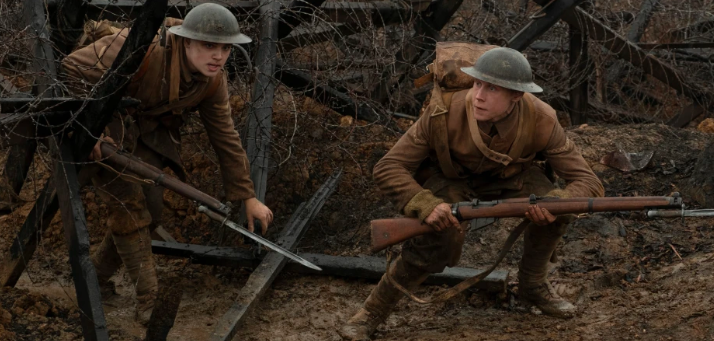The second the camera started moving slowly—drawing back from a shot of the blue sky, revealing two young soldiers taking a rest on grassy ground—it was clear that we’re in for a ride.
It kept on going. Slowly, at first. Making a few short pauses, and then gathering speed during tense moments in the film until it returns to its steady glide as we follow two young British soldiers, Lance Corporal Blake (Dean-Charles Chapman) and Lance Corporal Schofield (George MacKay), in their perilous mission in war-stricken France to relay an important message to British soldiers who are about to get in a lot of trouble.
Unlike most war films we’ve seen, 1917 provides a unique take on the genre. It’s quieter, a lot less gory but every bit as gripping and compelling.

It’s in the quiet moments in between frames, interspersed with Thomas Newman’s impeccable score, where the anxiety and emotions go up a notch. The nervous anticipation of what’s to come for the two young soldiers as they navigate their way to the front lines.
Although we know that they will, at more than one point, come face-to-face with many obstacles, the anticipation rises (and gets more intense) whenever silence engulfs the screen or when the the camera takes on the POV of one of the boys and it looks like we’re in the frame, unsure of what’s to come when we take a turn around a bend or when they slowly peek from the trench.
While the movie didn’t focus too much on World War I, in fact, the premise was very simple: two boys were tasked to relay orders. One is personally invested because his brother is among those troops ready to charge against the Germans.
Some might say it’s boring on paper. Well, the plot is thin and leaves little room for much character development or even remarkable dialogues. But, for some reason, Mendes’s decision to tell the story in a seemingly long continuous shot makes the viewing experience immersive—a smart move because it ensures that viewers will follow what’s in front of them. By making us a part of the experience, it wouldn’t matter if the script is well-written or not or if the plot has enough highlights to keep our engagement; because we’re in it, there’s no other choice but to see through it.
That’s smart film making.
Having said that, it doesn’t mean 1917 is not a good movie. Its being different is actually what make sit a really good movie to watch. Well, first, it’s technically stunning. It’s interesting how it looks so manicured—the dead bodies, remnants of towns that were ravaged by war, and even in the little cuts and wounds—yet still evoke that raw shock and terror that always come with seeing the scope of a war’s damage.
There’s one scene, in particular, that stood out that involved a really cool play with light and dark. The action that ensues in that sequence where the camera, score, and lighting all came together was so good.
At the end of the movie, Mendes pays homage to his grandfather which made the movie even more special in retrospect.
It all made sense for us, viewers. The elaborate framing and delicate work that went into choreographing every scene speaks a lot about how special this movie was for him.
Photos courtesy of United International Pictures

Leave a Reply